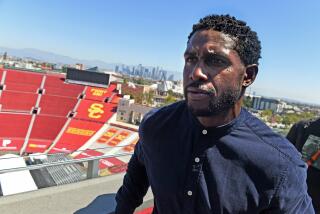Combative Neil Bush Defends His Actions at Silverado Hearing
- Share via
DENVER — A testy and combative Neil Bush, defending himself against conflict-of-interest charges as a savings and loan director, testified Thursday that “I never had any doubt or uncomfortable feeling” about close business ties with two men who borrowed millions of dollars from the S&L.;
“My loyalty to Silverado was never impaired,” Bush told a crowded courtroom, describing his three-year tenure on the board of Silverado Banking, Savings and Loan Assn.
However, the President’s son admitted, “I was a go-between” in seeking a $900,000 line of credit from Silverado for a joint venture in Argentina for himself and Denver developer Kenneth M. Good. No other Silverado director sought lines of credit or loans for his own business ventures, Bush acknowledged under questioning by an attorney for the federal Office of Thrift Supervision.
Bush’s testimony concluded the three days of hearings into the administrative complaint against him by the OTS, which is seeking a cease-and-desist order barring him from any future violations of conflict-of-interest regulations.
The OTS has accused Bush of violating conflict-of-interest rules by failing to inform his fellow directors of his business involvements with Good and Bill L. Walters, another prominent Denver developer active during the real estate boom of the mid-1980s. The two men defaulted on more than $130 million in loans from Silverado, contributing to its 1988 collapse and the government’s seizure of the Denver thrift.
Bush insisted that he would get no direct financial benefit from the $900,000 line of credit because it “was never to be funded,” but was simply designed to persuade the Argentine government that the business venture was sound. “I know it sounds bizarre,” Bush said. “I know it sounds like complete and utter nonsense.”
Bush acknowledged that he might eventually have benefited if the Argentine venture had been successful. It never got off the ground.
Bush said he had abstained when the board voted for the line of credit, more than fulfilling his ethical obligations.
In defending himself, Bush delivered impromptu lectures on his honesty. “I came to the conclusion that I was able to handle the responsibilities of a director, and I handled those responsibilities ably and well.”
His lengthy and discursive answers often prompted chastisement from Judge Daniel Davidson.
“I wish you would just answer the questions without . . . being concerned with telling me again and again and again that you have, in your opinion, more than adequately disclosed the relationships,” the judge said.
Explaining why he didn’t mention his businesses with Good and Walters on a conflict-of-interest form filed each year by Silverado directors, Bush said, “I had absolutely no doubt that I didn’t have a conflict.”
Walters provided $150,000 in 1983 as the initial capital for JNB, an oil exploration firm founded by Bush. Walters also was controlling shareholder in a bank that provided lines of credit exceeding $1 million for JNB. Good sought to buy an 80% share in the oil exploration firm for $3 million. The deal was never completed, but Good did furnish JNB with more than $1 million.
The funds from Walters and Good helped pay Bush’s salary, which started at $60,000 a year and ultimately rose to $120,000.
However, “the oil business involved very high risk and, unfortunately, investors in JNB Exploration Co. lost money,” Bush said.
The President’s son said the $150,000 Walters supplied to his business would never sway him in voting on any of the developer’s loan applications at Silverado. “My loyalty to Silverado was never impaired by my relationship with Bill Walters,” he said.
“I had nothing to gain,” Bush said. “There was no financial benefit, no benefit from any transaction that came before the board that related to Bill Walters. So there was no conflict and no need for a disclosure.”
This is the precise point of Bush’s disagreement with the OTS, which asserts that he breached his duty as a director by voting on Walters’ loans without filling out a formal report stating that he and Walters were in business together.
Bush’s defense seemed to focus on the theory that there was no conflict of interest without receiving direct cash benefits.
The Silverado board approved the $900,000 line of credit in November, 1986, for the joint venture in Argentina between Bush and Good.
A month later, the Silverado board agreed to accept a $3-million cash payment from Good, who was hard pressed financially. In return for the cash, the S&L; released more than $10 million worth of collateral it was holding against Good’s borrowings.
However, Bush did not tell the directors that at the same time, Good was seeking to buy control of his company, JNB, for $3 million.
“There was no need to make that disclosure because there wasn’t a firm agreement and I was just hoping he’d be able to come through with the funds,” Bush said.
“My loyalty was to Silverado and I treated every transaction the way other directors treated every transaction,” Bush insisted. During one somewhat lengthy digression in his testimony, Bush explained the “smell test” he uses to avoid any questionable business dealings.
He said, “If someone were to approach me and I felt that there was a motive that was rather sinister in trying to get some kind of political benefit from being involved with me or engaged in a business transaction with me, then I would automatically reject it. If it smelled, if my name was Mr. Smith would they be coming to me for an investment? And you know, that would be the test.”
More to Read
Inside the business of entertainment
The Wide Shot brings you news, analysis and insights on everything from streaming wars to production — and what it all means for the future.
You may occasionally receive promotional content from the Los Angeles Times.










